Modernising and transforming health care
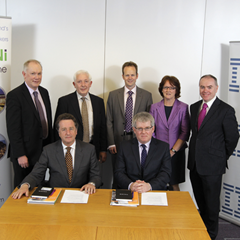 Managers and practitioners from the public and private sectors discuss ICT’s potential to improve health care in Northern Ireland.
Managers and practitioners from the public and private sectors discuss ICT’s potential to improve health care in Northern Ireland.
How has technology changed health care over the past decade?
Paul Duffy
People have become more reliant on technology. In many ways they sleepwalk into dependence on technology. There’s an awful lot riding on technology as a way of being a catalyst for change control and process change within the service but also as a way for us to reduce our costs and improve quality.
ICT as a profession should hopefully start to get more executive sponsorship as a mechanism to try and deliver that.
John Crawford
Information technology in healthcare compared to other sectors is still limited. We have only begun a journey towards using information technology in a really productive way in healthcare.
Most of the investments that we’ve seen are with hospital IT and to do with clinical systems, in particular investments in radiology and in lab systems. We haven’t seen so much investment in how technology might reduce demand on the service by giving patients the information, the tools and support to keep them out of the healthcare system.
So far it’s been an encouraging start but there are lots of examples of unsuccessful e- health projects.
Brian McKeown
Health has been a late adopter to technology in comparison to other industry sectors. Over the last few years there has been major investment in the whole infrastructure around trusts and that is starting to pay dividends now.
Radiology is the discipline that has benefitted most from the application of technology in terms of packs systems, picture archiving and communication systems. In Northern Ireland we now almost have a regional wide pack system, which has the potential to revolutionise how that whole discipline works.
Kevin McSorley
I see ICT as the enabler for service delivery, for both the consumer and from a provider’s perspective. The change has been what I would call the rise of the informed patient or the rise of the worried well patient, who have easier access to varying degrees of quality of information about their disease or condition.
Another big change is the concept that through technology more people could be supported to live at home and for longer at home.
Bernie Hannigan
An important element is the capturing and sharing of data for more profound analysis on an international basis. In a place the size of Northern Ireland this allows us to really see where improvements are being made and also to highlight inequalities and therefore focus better the remedies to action those inequalities.
Stephen Beattie
The advancements over the last 10 years have been focused internally within the health providers. The patient and client side of technology that provides healthcare has been less well developed. There is a desire to treat more patients at home without having an inpatients day or a visit to the hospital.
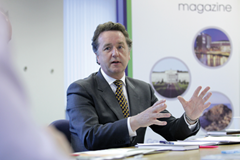 Is health different from delivering other public services?
Is health different from delivering other public services?
John Crawford
It is a matter of life and death and it is very complex. Healthcare systems have many, many, moving parts so one of the issues is how do you orchestrate all the different specialist facilities and equipment you need to provide particular care for a patient.
Medicine is a probabilistic science, it’s not a completely definitive thing. You can’t just come up with one formula that works for everybody so there’s a high degree of personalisation within it. Staff costs are very high compared to other industries because of the specialist skills that are needed and there’s an almost unlimited demand for healthcare. All these things make it a little bit special.
At the same time you can use some of the same ideas we’ve seen in other industries to standardise healthcare a bit more, certainly when it comes to information services.
Kevin McSorley
The health service is a bit more professionally driven and it’s due to the issues of criticality and confidentiality because it’s medical data which is involved.
These are complex systems, people inputting to the health and care support plans, people needing access to other information, wanting to rely on accuracy and integrity and completeness of the information and to have it available in real time. It needs to be simply used but complex enough to support that and that’s not easy.
Bernie Hannigan
We hear a lot of the time the mantra ‘no decision about me, without me’. You have to have informed individuals and only ICT has the ability to enable participation by people. It also means individuals now must know that they own their health and care records, be able to access them and have some input into what those records will actually be used for.
Research studies have indicated that people are very happy for their records to be shared in an appropriate fashion if it will offer better research and better healthcare for the future.
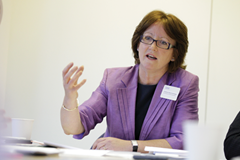 What are the barriers to innovation in healthcare?
What are the barriers to innovation in healthcare?
Kevin McSorley
Clinical time is a problem. We need to take a step back and rethink, reengineer and redesign how we do things and focus on the outcome. In my head it’s quite simple, move away from face-to-face contact to more informed sources. So it’s the web, it’s the call or perhaps a virtual visit. Technology can do many things but it’s getting healthcare professionals on board to rethink how care is delivered.
Paul Duffy
We’re not a heart on a stick, we are a total person and we need to be managed as a total person and we need the systems to reflect that. The trouble is that the human body is a very complex thing and the systems that support those individual components also need to be combined to produce a holistic view.
John Crawford
There’s a huge amount of innovation and doctors are some of the earliest adopters of all kinds of things from pagers to smart phones. But there’s a very strong cultural thing that if you take an innovative IT idea to a medical fraternity they want to be sure that it is the right approach to take and so they are looking for much more solid evidence.
The second thing is that a lot of clinicians have a problem with IT because it gets in the way of their practice, it actually slows them down. It’s easier for them to look at the patient and take notes than to sit at a keyboard and keep looking away. I think we have to make technology fit the clinician’s way of working and often it doesn’t.
Paul Duffy
It’s trying to get them bought into the idea that if they spend a little more time on the patient’s journey that will then benefit other people. It’s a system-based holistic view that we’re going to have to culturally move our people to.
Bernie Hannigan
There is a need for evidence-based healthcare but frequently the lack of evidence is taken as a reason for doing nothing. Also, the need for evidence and to break down this complex system into manageable projects has led to an enormous proliferation of pilots. The big barrier is that because the pilot is not a real world situation the roll-out of the evidence from it is actually enormously difficult and often doesn’t happen.
Paul Duffy
Deploying something on scale is the major issue and deploying something that is actually going to benefit the patient and the economy as a whole. I think we need to cut back some of the pilots and say: ‘If we are going to be doing this there will be ongoing funding once it hits the glass ceiling’.
Bernie Hannigan
I think clinicians tend to revert back to what they learnt during their early clinical education. There is great scope for the transformation of clinical education in Northern Ireland. I actually think there is scope for the private sector to participate in that. The DHSSPS spends many millions of pounds annually educating its workforce. I would suggest industry partnerships could really help resolve this barrier.
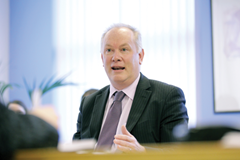 Brian McKeown
Brian McKeown
One of the major issues here is around budgets. The health system has to operate within a fixed limited budget. Money that’s spent on technology is money that is not spent somewhere else. We have to be a bit more grown up about how we manage those budgets because you can only spend the money once.
Paul Duffy
People need to stop seeing ICT as a back of house function. It started off like that but it has moved on considerably now and we need to professionally and culturally say now: ‘This is an adopted part of both the business and the clinical processes’.
Stephen Beattie
I believe the tide has begun to turn but there’s been perhaps a track record in the past of ICT innovation within health as being a solution looking for a problem. We were trying to say: ‘This is a great new piece of technology now let’s see what we can make it do’, rather than: ‘What is the problem and let’s see where technology helps’. It’s being approached from the wrong angle.
Have you been involved with any good case studies?
Brian McKeown
One of the projects that I’m working on is an electronic care proof of concept pilot. It’s a project that has been set up between the City Hospital in Belfast, the Ulster Hospital and a couple of the big GP practices. It is driven by doctors and not by IT or technology people. It’s been running for the past 15 months and has generated huge enthusiasm from the doctors that are involved in it.
It’s starting to pull information out of all the silos and make that available to the doctor or clinician at the point of care.
One of the benefits it has is that it’s not just within a single hospital or a single trust. The doctor in the Ulster hospital can actually see that his patient has been in the emergency department in the City. He can look at what drugs the GP has prescribed the patient or what other consultants have said about them. There’s big enthusiasm to roll this project out across Northern Ireland and, in fact, the new Health Minister’s party has it written into its manifesto.
There’s a business case going through the trust at the minute and it has the support of all the trust chief executives and all the board chief executives.
Paul Duffy
The community information system is being rolled out amongst all of Belfast. So from a social care perspective there is a single system that looks after everything that you need to do in the community area, whether it’s social services or community health. We can start to get real meaningful information, both in terms of business processes and in improving quality and making our services more efficient in delivering that.
Like everything else in health we tend to move on to the next project as quickly as we’ve closed down the other one. Maybe we need to have some time built in to do a review and find out the real benefit that has been delivered from that. We’re almost the victims of our own success because we don’t have time and because we have been so far behind in terms of the provisions of these systems.
Kevin McSorley
The whole concept of a patient portal that they can go in and look at their own readings, and help that whole self- education, will be Northern Ireland leading the way in the provision of technology at that simple patient-focused level.
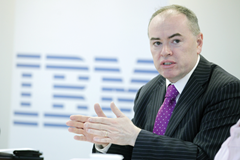 John Crawford
John Crawford
There are very large numbers of instances where technology has been successful in use in healthcare settings. These are not often looked at, in retrospect, to understand what the economic impact was.
This is something which the European Commission is interested in. The Commission can’t interfere directly in any healthcare systems but it can look at gathering as much information as it can on what’s been tried, and attach an economic value to show what the investment case is.
We need to have more of these success stories published with hard data showing: “This was the cost; this was the benefit; this is the investment profile of it.”
If something works very well in place, it should be possible to lift it and drop it. You’ve done that here with the Scottish emergency care summary record, and that’s probably saved you a lot of time and money. It’s a tiny record for each citizen which just has medication, history, and any known allergies and demographic data.
Brian McKeown
Everyone in the population was written to and given the option to opt out of it. That’s actually one of our significant issues in moving forward: patient consent. We followed the Scottish approach on that. We got an easier ride than if we would have done this on our own.
If we have an opt-in system, it is much less likely to work because most people don’t think about their health issues until they have a health issue. And if you haven’t opted in, in many cases, it could be too late at that stage.
Bernie Hannigan
We have the potential to identify the genetic profile of individual tumours from people to understand which drugs they are likely to respond to, and further to manufacture the new drugs that will be able to make a difference for that individual patient.
This also is a great example of how
Bernie Hannigan
technological advancement can drive the economy. That work is a major benefit for Almac Diagnostics, which of course is a multi-national company, but also indigenous companies.
With funding from the public sector, we established the Northern Ireland Biobank. That retains samples from the individual’s tumour, underpinned by an IT system provided by i-Path Diagnostics which is a local start-up. Those tissues will be retained and they can be interrogated by future new diagnostic technologies, yet to be invented.
John Crawford
One of the interesting things that we need to think about is not just that we can improve health systems in Europe but you could actually generate intellectual property in Europe that’s exportable to other parts of the world.
This is a huge global market and if Europe could develop knowledge around how to develop effective use of IT in healthcare, that’s a very exportable asset. That’s very much the agenda in Northern Ireland.
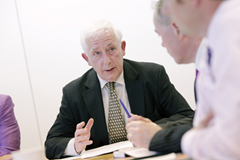 Does cloud offer the potential, particularly with strained budgets, to do more with less?
Does cloud offer the potential, particularly with strained budgets, to do more with less?
Paul Duffy
‘Cloud’ has to be of importance to healthcare if it’s going to drive down the costs of delivering that healthcare. It’s not about cost. It’s about quality of service. It’s about mobility and portability of your cloud.
There’s the lock-in that has to happen within the industry. Clouds are set up not as clouds but as silos.
People entrust their information to us. If we’re going to entrust them to another organisation, we need to get the explicit consent of that individual for that to happen.
Cloud is in its infancy and we’re really where we were with dotcom in the 90s and the early beginning of the millennium. It’s too early. It doesn’t really mean anything.
We have to reduce the cost of delivering our services and we have to make it much more simple. Cloud will drive greater economies and efficiencies within ICT providers to make sure they can deliver that. As long as we’ve got a service level agreement attached to it, then we’ll be ok.
Stephen Beattie
I’m sure cloud will provide opportunities but we need to have the need identified within our own organisations first and then see what the cloud can do for us and then make up a problem that the cloud will help us solve.
John Crawford
Cloud is at the top of the hype curve at the moment. You’ve got to bring it back to reality. Cloud is nothing more than another way of delivering IT services.
For me, the concept is when you turn your cold water tap on, you don’t care where the water came from, how it got there. When you plug in your mains electricity, you don’t care which generator produced it. You’re just accessing a service to achieve a particular result.
As a company, we’re looking very hard at cloud as a potential platform for some of the things we want to do with our smarter planet vision.
Unless you can guarantee that data are going to stay within the country, you may be breaching the laws of your jurisdiction by putting personal data in the cloud. For that reason alone, healthcare systems are going to be very reluctant to put any data onto a cloud platform for the moment.
There’s a project under way, which is partly sponsored by the World Health Organisation, called TCloud (or Trusted Cloud).
The idea is to say: “You need another category of service level which is the trusted cloud: something which will guarantee you a service level, confidentiality, how and where the data is being managed, and also other things like access rights and role-based access to data.”
Paul Duffy
Cloud is fine but they’re really talking about the established IT functions, whether it’s banking or financial services.
I don’t see anybody beating down a path to my door for the 600 applications that we have, the majority of which are two- or three- or four-user systems. How then are they going to connect them to the telemetry and the monitoring equipment?
The whole thing is being talked about as if everybody is running SAP and Siebel and these large, monolithic applications, but healthcare is entirely different from that.
The other thing that’s going to be a challenge to us is going to be consumerisation: the expectation of our patients and our clients about how they want to get involved in the provision of their own healthcare will force us to become much more patient-and client- focused.
We need to provide information to them but we need to do it in a way that the ‘worried well’ have the detail so we just don’t provide them with bald statistics. If we don’t do that, then all we’re going to do is let people then expect the healthcare system to underpin them rather than do it themselves.
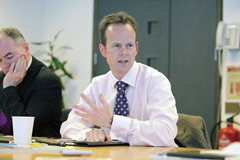 What’s the crunch area with the population living longer and with less funding?
What’s the crunch area with the population living longer and with less funding?
Kevin McSorley
We can’t continue to deliver healthcare tomorrow as we do it today. We have more older people, we’ve more chronically ill people, we’ve more consumer demand and expectation, we’ve less informal care, we’ve less carers, we’ve less money.
These are all huge drivers that say: “We have to re-envisage how we deliver healthcare.” ICT is the key enabler but to get it across the line, it has to have clinical trust and confidence.
Paul Duffy
It’s systemic change in the way that we view healthcare and the way we deliver healthcare. It’s a bit like global warming. Until the water laps around your door, you’re really not too sure what’s going to happen.
We’re really going to have to educate patients and clients (therefore voters) about what we can do with the available resource, and meet those expectations. And we need to provide systems that will help that process to take place.
Stephen Beattie
In different regions of the same country, there can be very different priorities for where they want the investment to go. Pilots and little silos of projects get run in a small sense but, for their neighbour, that’s not a priority to them.
You end up with very disjointed projects. Perhaps if there was a clearer priorities document which said this is what we want to concentrate on and this is where the investment should go, it could provide that direction. In hospital trusts, we’re all starting from different positions, and there are different technology priorities and different things we need to invest in before we start to look at common projects that need to run on that infrastructure that we have in place.
Brian McKeown
One of the ‘pedestrian’ crunch areas is the lack of good project managers within the system and the lack of space to change how things are done. There is very little spare capacity in the system, at the clinical or management end, to step back and look at how we’re doing things. We do need to make a much bigger effort to put some resource into modernising.
Bernie Hannigan
There’s a slight tension in that a lot of people went into healthcare professions because they enjoy dealing with people. The fact then that they have spent quite an amount of time interacting with IT is something that people choose to avoid. It goes back to an overall culture change. How is IT delivered? What are the functions that are essential for the delivery of healthcare to people?
What ICT areas should the new Health Minister focus on?
Brian McKeown
One of the key areas we have to invest more time and money in is community and social care, which has got poor ICT support; a huge cultural change has to take place there. That and a shared electronic record.
Kevin McSorley
The shared electronic record is absolutely key because that’s one of the areas where the remote telemonitoring project fails. It started off with a vision and understood the need to have a single patient record to be shared. For cost reasons, that’s been scaled back so we have lots of data being gathered through our own telemonitoring project which doesn’t reference the electronic patient record. That’s a very simple thing to achieve with a bit of investment and a bit of planning, which will make a huge difference.
Paul Duffy
Doing away with unstructured data, whether that’s captured mostly on paper or whether it’s on ad hoc systems that don’t allow themselves to be fed back in. Wouldn’t it be easier if you could combine all the information that we’re getting and help the system to assist the clinician to do his or her job much more effectively?
Stop seeing the input of information as something that only I need to see in my own hand-writing but something that says: “I’m doing it in a certain way that other professionals can take and use to provide levels of holistic care and combining all that into an expression of a holistic view of the patient.” We can take all of this information and re-present that based on who’s referring or looking at that.
John Crawford
We need to start joining up our health and social care systems because a lot of health and social care problems are very inter- related. And therefore we need to have a way of doing that and that implies that we need to know who your citizens are and what services they’re using.
The unique system identifier doesn’t have to be a database in the sky. It needs to be a set of technologies that allow you to identify who is who and link that information together in real time if necessary.
Think about how you’re going to join up your existing systems. It’s not going to be a federated model.
You then get the chance of designing orchestrated care: the idea of case management or being able to come up with a complete care package for somebody that involves lots of different elements provided by the state or by the private sector, and making the patient navigation much easier.
You have then got the option to go into co- production of health: to get the patients to do more themselves and to be more willing to take on more responsibility for their healthcare risks and issues.
Today, healthcare systems almost wait until people walk in the door before they respond to them. If you’ve got the right data, you could accurately predict who is going to be admitted in the next two years.
You have could predict people who would benefit from screening and from early intervention, from some of the new treatments that are coming through from medical science.
Finally, you’ve got to think about the job of IT to improve health literacy. We need to give people the tools to understand how to make the right decisions every day affecting their healthcare.
Kevin McSorley
The focus is how the system responds to the critical incident and the people who are ill. Health should be about prevention and promotion looking forward. It’s not about who’s ill; it’s about everybody.
Bernie Hannigan
It should be when they switch on the computer or whatever the link is where it is delivered to them. Cancer Research UK is partnering with Wikipedia to ensure that the cancer information that is online is actually accurate and doesn’t create a whole new bunch of unnecessarily worried people: empowering people through accurate knowledge.
John Crawford
There’s another, even more expensive, category which is the ‘unworried unwell’. People who are basically taking many different health risks knowing that they can fall back on the healthcare system.
Maybe you’ve got to take a very different approach to that particular population. I don’t know what it is but technology can play a part in it.





